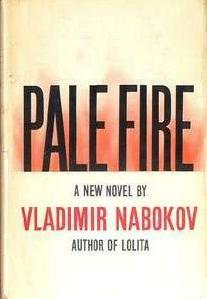
Pale Fire is a 1962 novel by Vladimir Nabokov. The novel is presented as a 999-line poem titled "Pale Fire", written by the fictional poet John Shade, with a foreword, lengthy commentary and index written by Shade's neighbor and academic colleague, Charles Kinbote. Together these elements form a narrative in which both fictional authors are central characters. Nabokov wrote Pale Fire in 1960–61, after the success of Lolita had made him financially independent, allowing him to retire from teaching and return to Europe. Nabokov began writing the novel in Nice and completed it in Montreux, Switzerland.
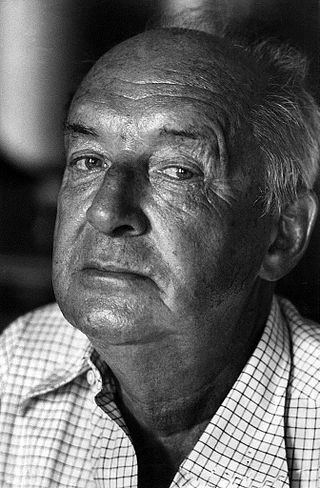
Vladimir Vladimirovich Nabokov, also known by the pen name Vladimir Sirin, was an expatriate Russian and Russian-American novelist, poet, translator, and entomologist. Born in Imperial Russia in 1899, Nabokov wrote his first nine novels in Russian (1926–1938) while living in Berlin, where he met his wife. He achieved international acclaim and prominence after moving to the United States, where he began writing in English. Nabokov became an American citizen in 1945 and lived mostly on the East Coast before returning to Europe in 1961, where he settled in Montreux, Switzerland.
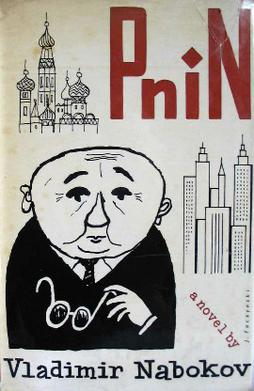
Pnin is Vladimir Nabokov's 13th novel and his fourth written in English; it was published in 1957. The success of Pnin in the United States launched Nabokov's career into literary prominence. Its eponymous protagonist, Timofey Pavlovich Pnin, is a Russian-born assistant professor in his 50s living in the United States, whose character is believed to be based partially on the life of both Nabokov's colleague Marc Szeftel as well as on Nabokov himself. Exiled by the Russian Revolution and what he calls the "Hitler war", Pnin teaches Russian at the fictional Waindell College, loosely inspired by Cornell University and Wellesley College—places where Nabokov himself taught.
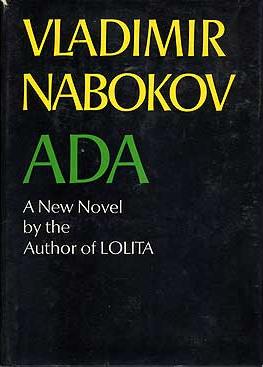
Ada or Ardor: A Family Chronicle is a novel by Vladimir Nabokov published in 1969.

Nabokov's Congeries was a collection of work by Vladimir Nabokov published in 1968 and reprinted in 1971 as The Portable Nabokov. Because Nabokov supervised its production less than a decade before he died, it is useful in attempting to identify which works Nabokov considered to be his best, especially among his short stories.

Brian David Boyd is a professor of literature known primarily as an expert on the life and works of author Vladimir Nabokov and on literature and evolution. He is a University Distinguished Professor in the Department of English at the University of Auckland, New Zealand.
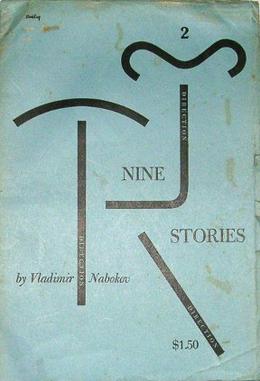
Nine Stories is an English-language collection of stories written in Russian, French, and English by Vladimir Nabokov. It was published in 1947 by New Directions in New York City, as the second issue of a serial, Direction.

Nabokov's Dozen (1958) a collection of 13 short stories by Vladimir Nabokov previously published in American magazines.
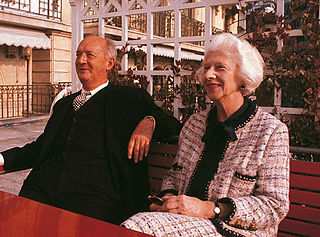
Véra Yevseyevna Nabokova was the wife, editor, and translator of Russian writer Vladimir Nabokov, and a source of inspiration for many of his works.
"Spring in Fialta" is a short story written by Vladimir Nabokov in 1936, originally as Весна в Фиальте in Russian, during his exile in Berlin. The English translation was performed by Nabokov and Peter Pertzov. Spring in Fialta is included in Nine Stories and Nabokov's Dozen.

A Russian Beauty and Other Stories is a collection of thirteen short stories by Russian author Vladimir Nabokov. The short stories in this collection were originally written in Russian between 1927 and 1940 under the pseudonym Vladimir Sirin. Before being collated into short story collections, some were published by various European Russian émigré newspapers and magazines.
"Lips to Lips" is a short story written in Russian by Vladimir Nabokov in Berlin in or about 1931. It was first published in 1956 as part of the collection Vesna v Fialte. After its translation into English by the author and his son it was first published in Esquire in 1971 and then in the collection A Russian Beauty and Other Stories in 1971.
This is a list of works by writer Vladimir Nabokov.

Details of a Sunset is a short story by Vladimir Nabokov written in Russian under his pen name Vladimir Sirin in Berlin in 1924.
Sounds is a short story by Russian American author Vladimir Nabokov originally written in Russian in September 1923.
The Wood-Sprite is a story by Vladimir Nabokov, originally published in Russian in 1921. It was his first published story.
"Music" is a short story by Russian American author Vladimir Nabokov originally published in Russian in 1932.
Orache is a short story by Russian American author Vladimir Nabokov originally published in Russian in 1932.
The Passenger is a short story by Russian American author Vladimir Nabokov originally published in Russian in 1927.
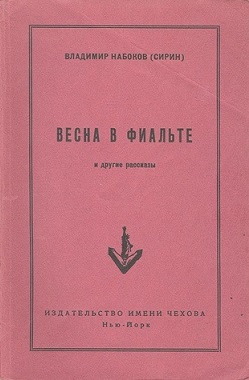
Spring in Fialta and other stories is a collection of short stories by the Russian author Vladimir Nabokov. The collection contains 14 short stories written between 1931 and 1940. It was originally planned to be published in 1939 in Paris; however, due to the approach of World War II, it became an abandoned project.











